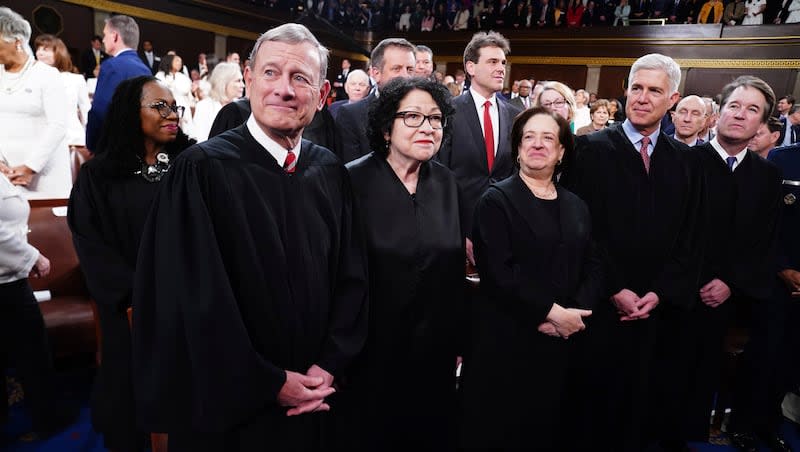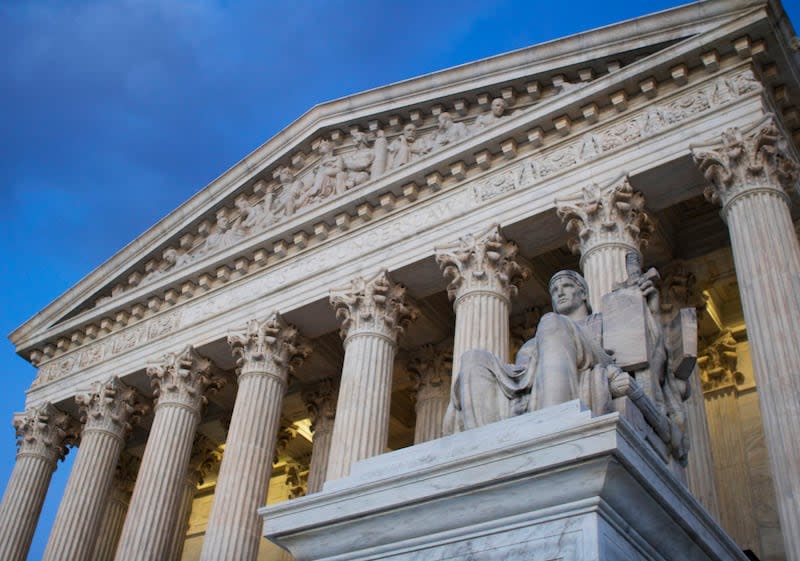The Supreme Court is doing its job

- Oops!Something went wrong.Please try again later.
- Oops!Something went wrong.Please try again later.
- Oops!Something went wrong.Please try again later.
- Oops!Something went wrong.Please try again later.
- Oops!Something went wrong.Please try again later.
- Oops!Something went wrong.Please try again later.
“The Supreme Court was wrong. It must be evil.”
If you haven’t seen a hundred versions of that headline, I’d love to know where you get your news. It almost doesn’t matter whether you’re left, right or center — if you’ve listened to Supreme Court news lately, you’ve almost certainly heard that it got something wrong.
Are you angry about the former President Donald Trump prosecutions? Or just about Trump? Either way, you can go on being angry: Yes, he has immunity for many official acts, but most of the charges against him can go forward anyway.
Are you really into gun rights — or gun control? Then you, too, can be angry, either because eight justices rejected a strict application of the Second Amendment or because all nine of them stood up for the NRA.
Are you frightened by the alleged demise of the administrative state? Consider that even this court — the most agency-skeptical Supreme Court of my lifetime — still wasn’t willing to shut down one of conservatives’ least favorite agencies. The decision in that case was 7–2 and drafted by Justice Clarence Thomas, the court’s most famous conservative.
And then there’s my own client, the state of Idaho. One day, the Supreme Court cited our amicus a half dozen times while rescuing us from a burdensome 9th Circuit precedent about homelessness; the next day, changed its mind about our cert petition in an abortion case and told us to try again later. (In the meantime, thanks to concessions by the Biden administration, Idaho’s abortion law remains “almost entirely intact.”)
My point is not that the Supreme Court is getting everything right, or that its mistakes are harmless, or that it’s Solomonically splitting every difference between liberals and conservatives. I can’t dispute the Supreme Court is conservative, at least when compared to the courts of recent generations.
My point, rather, is that this conservative Supreme Court is still a court — still looking for the right lines to draw and still defending them against attacks from both sides; still articulating the reasons for its decisions and trying, however imperfectly, to apply them consistently from case to case.
And yet plenty of Supreme Court coverage seems to conclude the opposite — bewailing that the Supreme Court has been bought by billionaires, captured by theocrats or suborned by Trump; in short, that the court is evil and the sky is falling.
Why is so much Supreme Court coverage so bad?
I’ll give you a short answer, but here’s a long one first, based on that homelessness case I mentioned a moment ago. If you’re not interested in the legal details, feel free to skip to the last few paragraphs.
A town in Oregon had a problem with homeless encampments, so it more or less prohibited sleeping on public property. (I’m leaving out some complications.) The town was sued and ordered not to enforce the ordinance unless it had enough shelter beds for all its homeless people to sleep in.
The order does have a certain logic to it. If a person has literally nowhere to go except public property, then he can’t just choose not to sleep — try as he might, at some point he’s going to nod off and thereby break the law. Is it fair to punish him for doing something he is completely powerless to avoid?
That logic had precedent. Back in the 1960s, the Supreme Court came close to ruling that people can’t be convicted for actions they are powerless to avoid — one case almost overturned a conviction for public drunkenness because the defendant was an alcoholic and couldn’t help it. “Sounds like our homeless plaintiffs,” the 9th Circuit essentially concluded.
So does that settle the matter? The 9th Circuit got it right, and the only reason the Supreme Court disagrees is that it hates homeless people?
But wait — sleeping isn’t the only bodily function that people literally can’t avoid. If they can sleep in public because they have nowhere else to go, can they also, well, go in public when they have nowhere else to go?

If it’s rainy, do they have a right to tents? Does cold weather give them a right to fire? If the public parks are full, can they squat on private property? They can’t help needing to eat — if the 9th Circuit is right, can they even be punished for stealing food?
This kind of thinking has such far-reaching consequences that most judges wanted nothing to do with those old 1960s precedents, which went unapplied by the Supreme Court for more than 50 years. But when the 9th Circuit took this view to address homelessness, it caused so many problems that even the governor of California asked the Supreme Court to fix it.
And as for the actual constitutional text at issue — ”cruel and unusual Punishments (shall not be) inflicted” — what exactly does that have to do with homelessness?
The obvious originalist answer, the one that persuaded the Supreme Court, is “nothing.”
Here, in a single, relatively simple case, we have to consider questions of justice, policy, precedent, and constitutional text and history — all relevant, all pointing in different directions, and each more complicated than the last 400 words could explain.
How is a news company supposed to capture all that in a nine-word headline? It can’t, and so even very good journalists are stuck with true-but-inadequate summaries like “Justices uphold laws targeting homelessness with criminal penalties,” while the less very-good ones run straight to “The Supreme Court is evil” or, in Slate’s words, “These are new depths of cruelty.”
Now back to the short answer I promised to those of you who weren’t interested in the legal details and just wanted to know whom to blame. My short answer is …
It’s you — you’re the problem.
If you’re not interested in the details of the law but still insist on having an opinion about it, then “The Supreme Court is evil” is exactly the sort of opinion you’re going to have and exactly the sort of headline you’re going to want to read.
Law isn’t quantum mechanics, but no one understands it without work. If you want to criticize the Supreme Court — and sometimes there’s plenty to criticize — then do the work first. Ignore the clickbait, get your court news from SCOTUSblog, and go listen to some of the brilliant podcasts that are thrilled to explain everything — Advisory Opinions or SCOTUS 101 for conservatives, Bloomberg Law for liberals and business types, Divided Argument or Amarica’s Constitution for the nerds, and so on.
If you’re not willing to do the work, then that’s absolutely fine: Not everybody has to be a court-watcher. But if that’s your choice, remember, the next time you hear the Supreme Court has done something horrifying, you may not actually be understanding it — and neither do most of the people who are telling you the court is evil and the sky is falling.
Instead of listening to them, assume that the justices — even the ones you disagree with — are smart people tackling hard problems in good faith. That approach may not be as entertaining, but you will be much, much closer to the truth.
Alan Hurst is the solicitor general of Idaho. His views are his own and do not represent those of the state or the attorney general.

